Big goals, small team? You need clarity - not complexity.
As a small business or lean team, your biggest strength is speed. But without a clear system to track goals, it’s easy to get pulled in 10 directions, lose focus, and slow down.
That’s where OKRs come in - a simple, proven framework to align your team, track what matters, and move faster with confidence.
The problem? Most OKR software was built for enterprises. Packed with HR features. Priced per user. Designed for 500-person orgs - not scrappy 5-person teams.
In this article, we break down 8 affordable OKR tools that actually work for small teams: fast to set up, easy to use, and priced for real-world budgets.
What Makes OKR Software Great for Small Businesses?
If you’re a team of 3 to 20, your priorities are speed, simplicity, and staying focused - not enterprise-level dashboards or complex admin panels.
The best OKR tools for small businesses share a few key traits:
- Fast setup – you can go from signup to live goals in under 30 minutes
- Async-friendly – updates happen without adding more meetings
- Simple pricing – flat rates or team-friendly plans (no $10/user surprises)
- Lightweight design – no clutter, just clear goals and visible progress
These aren’t tools for HR departments - they’re built for founders, product leads, and startup teams who want clarity without overhead.
Here are 8 OKR tools that check those boxes.
1. OKRs Tool
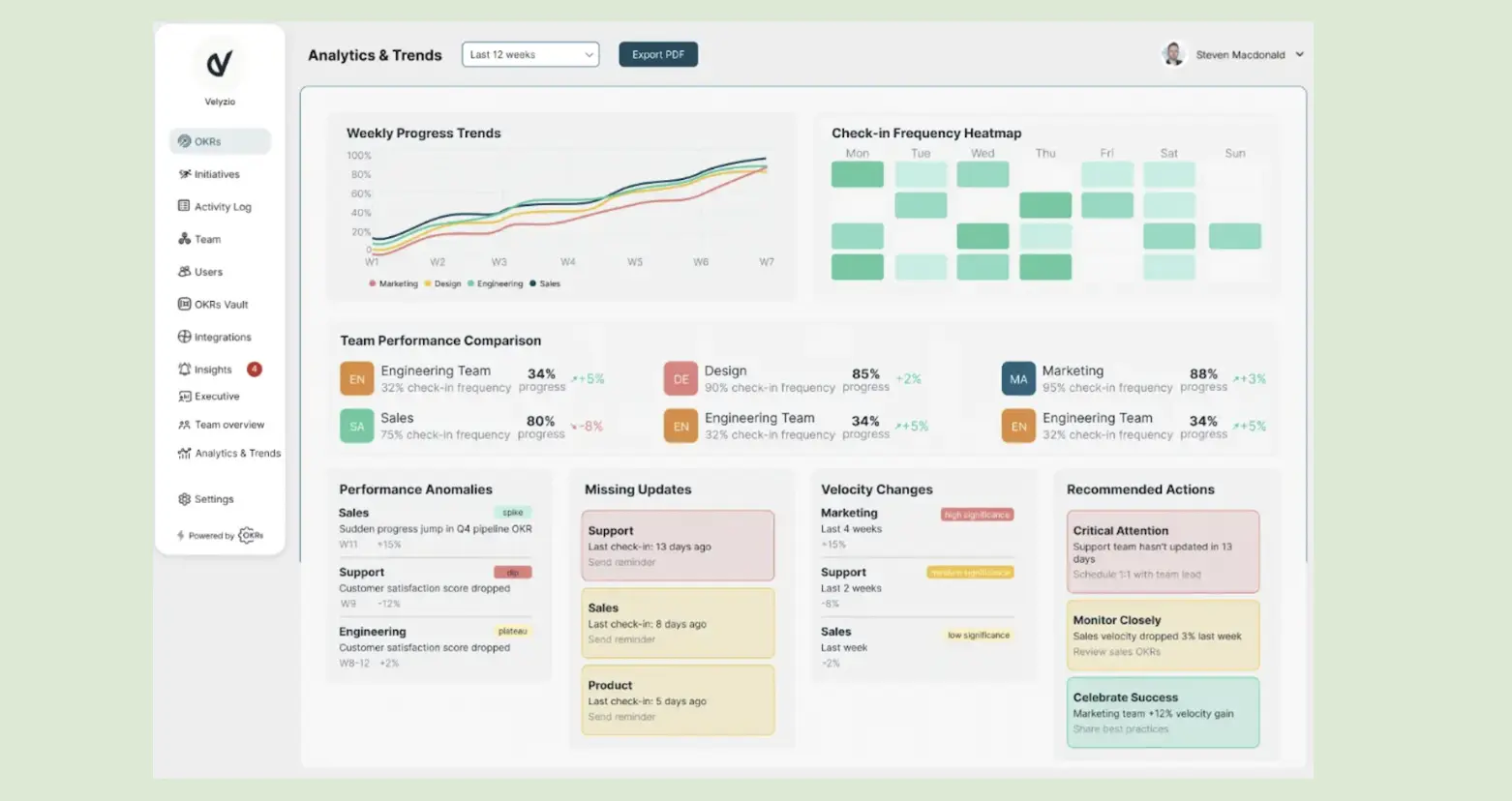
OKRs Tool is a lightweight, AI-powered platform built specifically for startups and small businesses. It helps you launch and track OKRs without needing a manual - or a meeting. Clean, fast, and refreshingly focused.
Product highlights:
- AI-generated OKRs and initiative suggestions
- Team-based pricing (not per-user)
- Slack integration for async check-ins
- Dead-simple onboarding - usable in under 10 minutes
OKRs Tool is one of the fastest ways for small businesses to go from “zero to live OKRs.”
The AI suggestions are genuinely helpful - and reduce the blank-page problem. What really stands out is the ease of setup: within 3-5 minutes, most teams will have structured goals, initiatives, and a rhythm for check-ins. It’s clearly built for small teams, with team-based pricing and a Slack integration that keeps updates async and visible.
That said, it’s still early-stage software: reporting is minimal, and integrations are limited. But for scrappy teams that care about speed and clarity, it delivers serious value - especially for free.
Price: Free for 1–5 users and $30/month when you're ready to scale.
OKRs Tool is best for Startups and small teams who want to launch OKRs quickly and stay focused without complexity
2. Tability
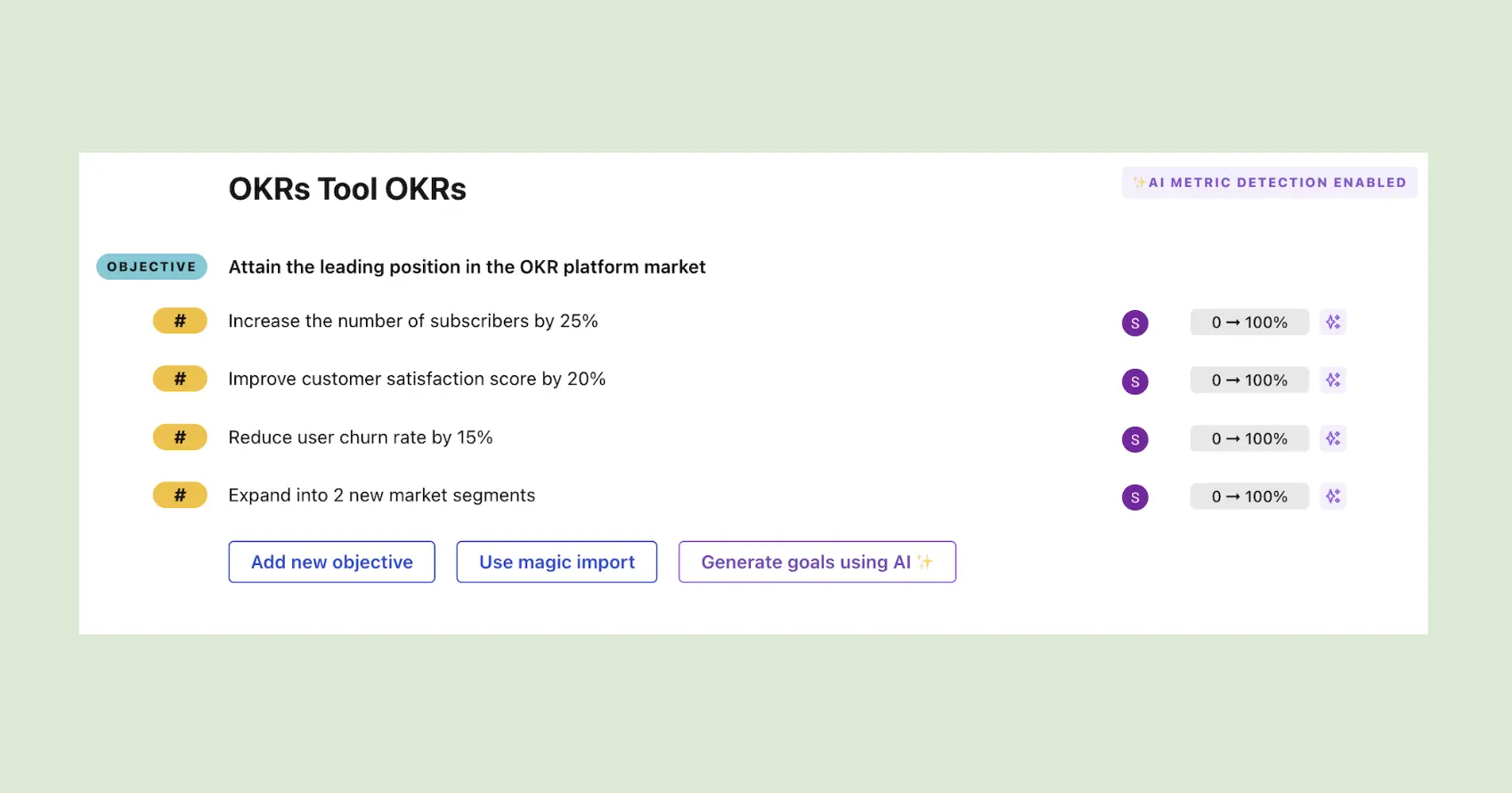
Tability is a habit-forming OKR tool built around weekly check-ins and progress updates - without needing constant meetings. It helps teams stay on track through smart nudges, reminders, and lightweight updates. For small businesses trying to build an execution rhythm, this is one of the best tools out there.
Product highlights:
- Real-time progress tracking
- Weekly check-in reminders via email and Slack
- Beautiful, modern UI
- Easy filtering by owners, tags, or status
What makes Tability stand out is its emphasis on accountability without micromanagement. Instead of forcing you to hold meetings or build dashboards, it prompts users to check in regularly, helping teams build the muscle of consistent goal tracking.
The interface is clean and motivating - though some users may feel overwhelmed by the number of different views early on. Once you're familiar with the layout, it's powerful, especially for product or growth teams used to async updates.
Price: Starts at $6/user/month. 14-day free trial available (credit card required)
Best for: Small teams that want to drive weekly goal updates without adding meetings
3. SimpleOKR
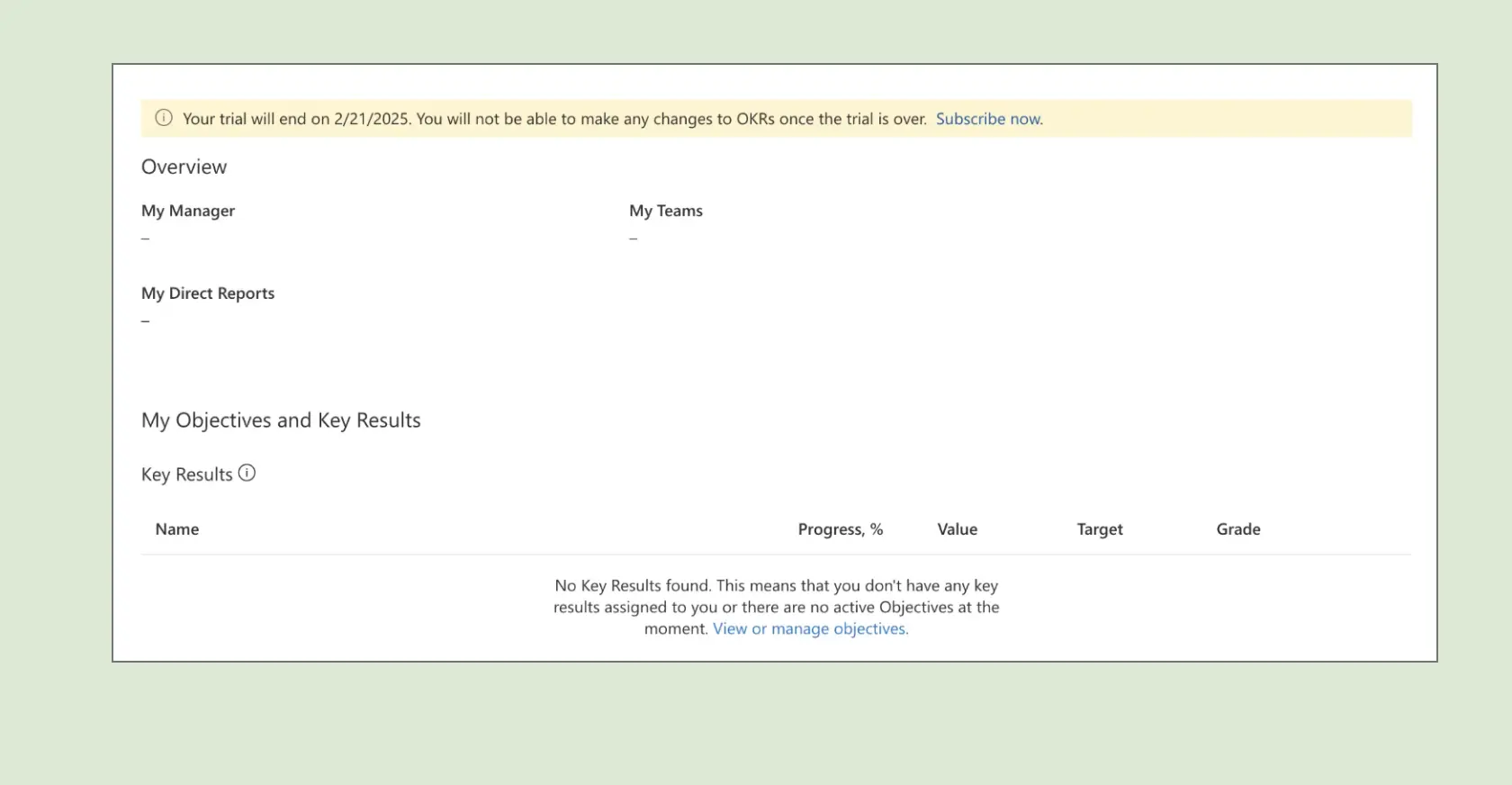
SimpleOKR does exactly what it says on the tin: it keeps your OKRs simple. Designed with minimalism in mind, this tool is ideal for small businesses that don’t need dashboards, AI, or complicated workflows - just a straightforward way to set and track goals.
Product highlights:
- Flat-fee pricing (no per-user charges)
- Clean interface with essential OKR features
- New beta UI available for improved visuals
- Fast setup, even for non-technical users
SimpleOKR is a great pick for startups or small businesses that want to avoid per-seat pricing. The flat $49.99/month rate gives unlimited users access, making it especially cost-effective for growing teams.
The experience is basic, and that’s the point. However, its legacy interface feels dated, and there’s little in the way of reporting or integrations. Still, if your team just needs a reliable OKR tracker, this one nails it.
Price: $49.99/month flat fee (unlimited users)
Best for: Small businesses that want a simple OKR tool with predictable pricing
4. Weekdone
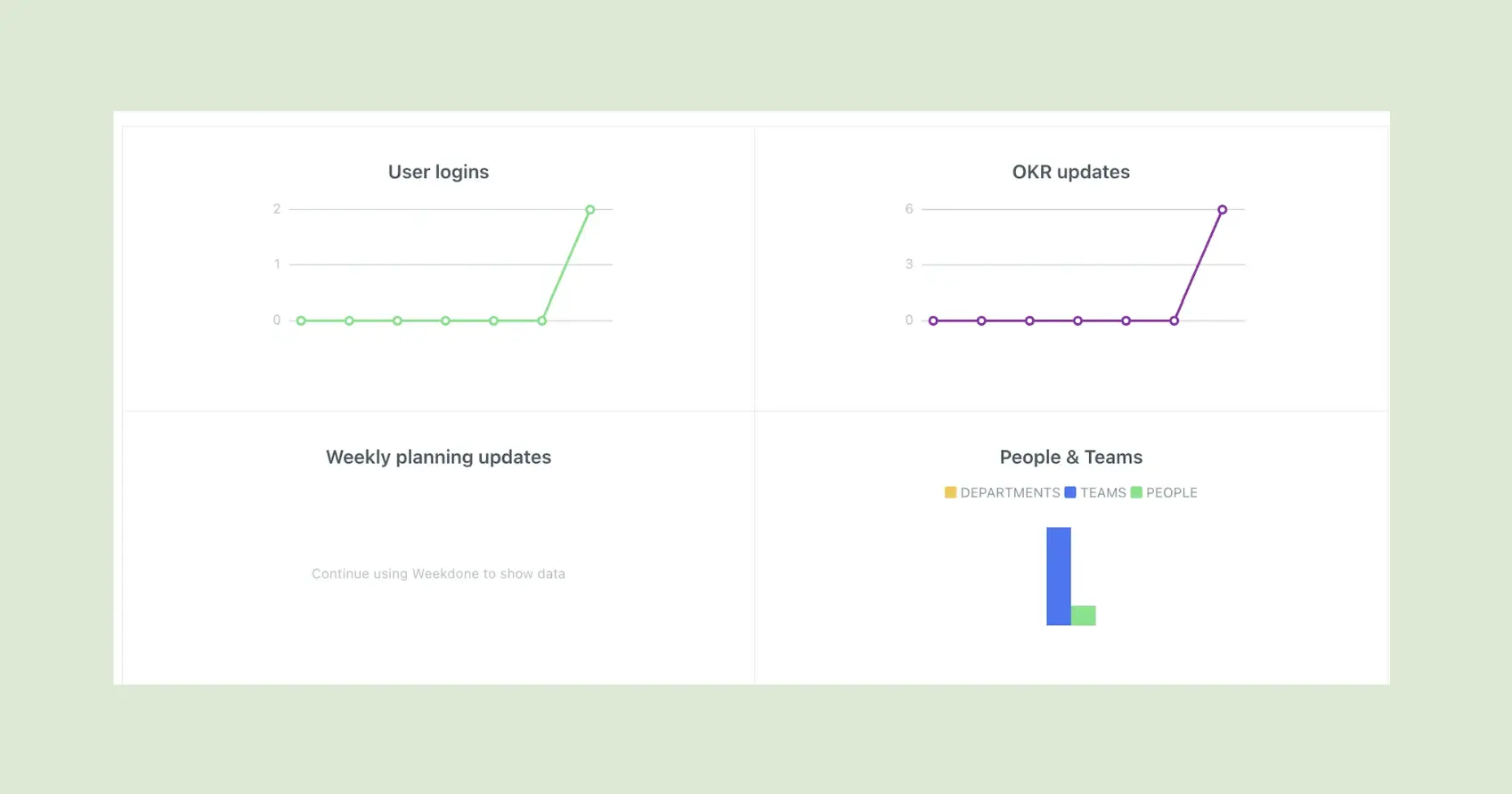
Weekdone brings OKRs and weekly updates together in one tool, making it easy for small businesses to stay aligned and accountable. With built-in dashboards and status reports, it’s especially useful for managers or team leads who want visibility without having to micromanage.
Product highlights:
- Weekly check-ins and planning
- Visual dashboards for goal tracking
- Team pulse reports and summary views
- OKR linking across teams or departments
Weekdone is perfect for early-stage teams that need structure around progress updates. It helps build the habit of weekly check-ins, which is key for momentum - especially in hybrid or async environments.
The built-in reports give team leads a snapshot of what’s moving (and what’s not), without having to chase updates manually. That said, the UI starts to feel cramped as your team grows, and power users may find it limiting in terms of customization. Still, for small teams, it strikes a strong balance between simplicity and structure.
Price: Free for 3 users; $10/user/month after that
Best for: Founders or team leads who want lightweight reporting built into their OKRs
5. GetJop

GetJop is a lightweight OKR and performance management tool that’s built with small businesses in mind. It blends simple goal-setting features with basic HR tools like 1:1 tracking and performance reviews - all in one clean platform.
Product highlights:
- Easy OKR creation and team assignment
- Built-in 1:1s, feedback, and performance tracking
- Dashboard for visibility across teams
- Templates and progress tracking
If your startup is small but already thinking about performance conversations and feedback, GetJop is a smart pick. You won’t just be setting goals - you’ll be managing team development in parallel. It’s not bloated like most HR tools, and setup is refreshingly straightforward.
That said, the UX leans more toward HR than product, so it may feel overbuilt if you just want simple OKR tracking. It’s also not ideal for advanced workflows or integrations, but for small teams looking to tie goals and growth together, it works well.
Price: Free plan available; paid plans on request
Best for: Small businesses who want OKRs plus basic performance reviews or 1:1s
6. Synergita
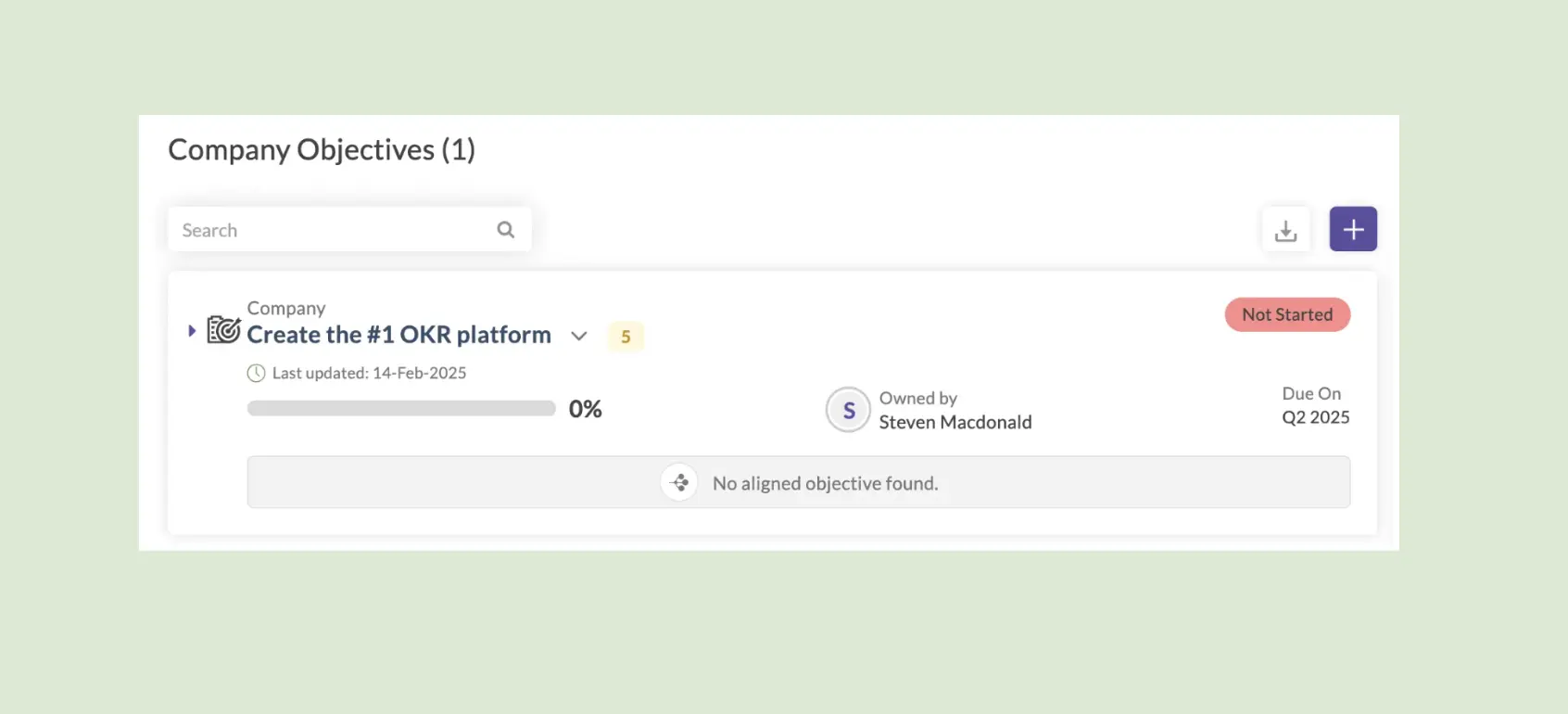
Synergita is an OKR and performance platform designed for growing teams that want to connect goal-setting with employee development. It’s not just a tracker - it’s a lightweight performance suite with a focus on continuous feedback and people growth.
Product highlights:
- Set and manage OKRs for individuals, teams, or company-wide
- Integrated performance reviews and growth plans
- Continuous feedback tools
- Simple, clean interface for small teams
Synergita stands out because it goes beyond just OKRs. It’s particularly useful for founders who are already thinking about scaling the team and building a performance culture. The interface is intuitive and doesn’t overwhelm, which makes onboarding easy - especially for smaller orgs without a People Ops lead.
However, some aspects of OKR progress tracking feel clunky, and updating key results isn’t always as smooth as you’d like. It also leans slightly more HR than product, but that’s exactly the draw for teams that care about growth conversations and structured reviews alongside their goals.
Price: Free for 1 company OKR; paid plans available on request
Best for: Startups preparing for team growth with performance + OKRs in one place
7. SugarOKR

SugarOKR is a barebones OKR tracker for teams that want simplicity above all else. It strips away the bells and whistles to give you a fast, frictionless way to set goals, track progress, and stay on course - no logins, training, or onboarding required.
Product highlights:
- Simple interface with color-coded progress
- Zero-friction setup - usable in minutes
- No unnecessary features or distractions
- Free plan available
If you’re a small team that just wants to track goals - and not manage performance, strategy maps, or integrations - SugarOKR delivers. It’s a no-fluff tool that gets out of the way and helps you focus. But the tradeoff? It’s very limited.
There are no check-ins, no Slack or email nudges, no analytics - just a simple grid for goals and progress. That may be a deal-breaker for some, but for founders who want clarity without overhead, SugarOKR is a surprisingly effective option.
Price: Free plan available
Best for: Teams that want a minimal, free OKR tracker with zero complexity.
8. Week Plan
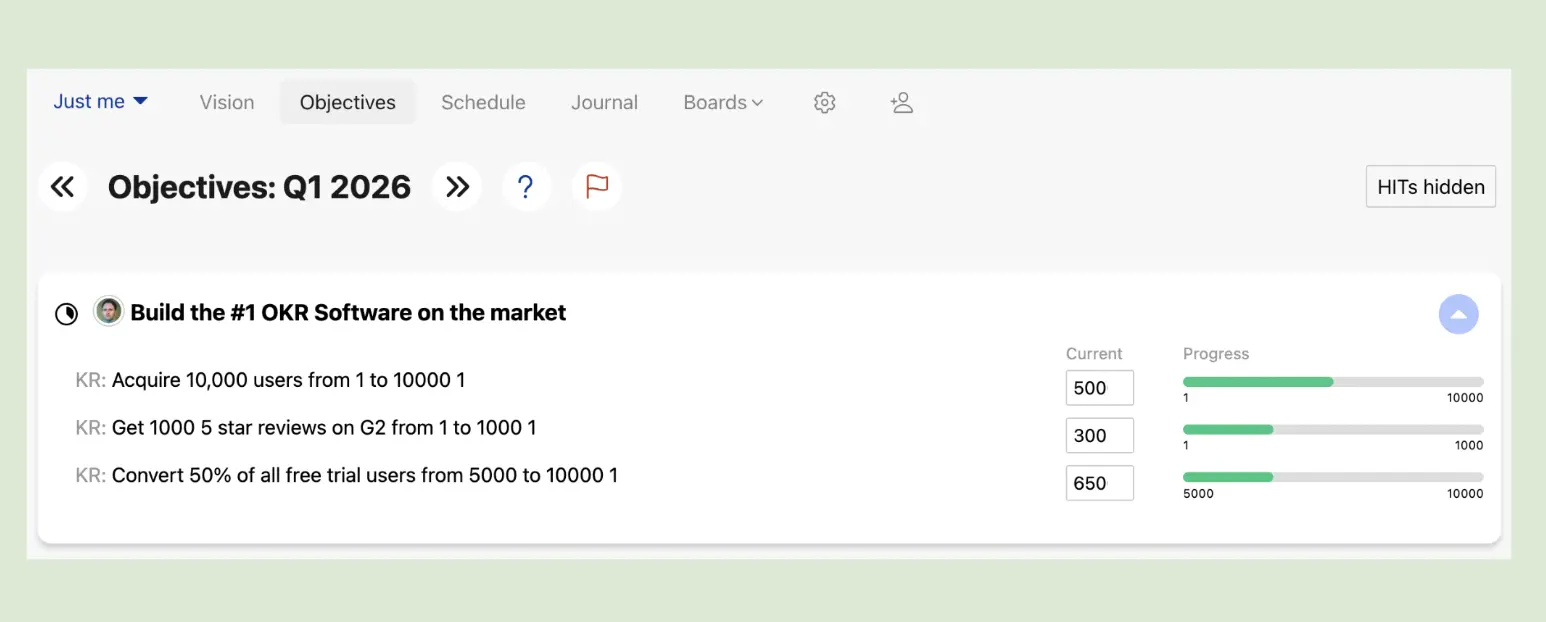
Week Plan is a personal productivity and lightweight OKR tool built around weekly planning, priorities, and execution. Rather than running company-wide OKR programs, it focuses on helping individuals and very small teams turn goals into scheduled, actionable work.
Product highlights:
- Small-team OKRs linked to weekly priorities
- Google & Outlook Calendar integration
- Multilingual support, including Polish, French, and Spanish
What sets Week Plan apart is how personal it feels compared to traditional OKR tools. Instead of dashboards and reports, it encourages you to translate objectives into real calendar time - which makes execution much more tangible.
The calendar integration is the standout feature, especially for users who already plan their week in Google or Outlook. Being able to see OKRs alongside meetings and tasks helps bridge the gap between strategy and daily work.
Price: Free for personal use.
Free trial: Yes
Best for: Founders, solo operators, or very small teams.
OKR Tools for Small Businesses: Side-by-Side Comparison
We’ve put together a quick comparison of all 8 OKR tools covered in this guide. This snapshot shows which tool fits which kind of small team, how pricing works, and what each one is best known for.
Whether you're running a remote startup, a fast-growing agency, or a product-led SaaS, use this table to zero in on the tool that matches how your team actually works.
As you can see, there’s no one-size-fits-all answer - but there is a best-fit tool for your small business.
If your top priorities are speed, clarity, and staying aligned without micromanagement, lightweight tools like OKRs Tool, Tability, and SimpleOKR deliver serious value without the enterprise bloat.
On the other hand, if you're ready to layer in performance management or HR features, tools like GetJop and Synergita offer a broader suite.
What to Look for in OKR Tools (for Small Businesses)
Not every OKR tool is built for lean, fast-moving teams. If you’re a startup or small business, here are five things that actually matter when picking a platform:
1. Fast Setup (No Consultants Required)
You should be able to sign up, set your first OKR, and invite your team - all within 30 minutes. If a tool needs onboarding sessions or admin configuration, it’s not built for speed. Look for plug-and-play templates, AI help, or minimal setup flows.
2. Async-First Check-Ins
The best OKR tools work without adding meetings. Weekly nudges, Slack updates, and async check-ins let your team stay aligned without disrupting deep work. Meeting-heavy tools break momentum - small teams need lightweight, automated rhythms.
3. Simple, Scalable Pricing
Avoid per-user pricing if you’re planning to grow. Flat-rate or generous free plans mean you can bring in new hires or collaborators without blowing up your budget. Transparent pricing = less friction, fewer approvals, faster adoption.
4. Built to Drive Focus — Not Just Store Goals
The right tool shouldn’t just hold your OKRs - it should help you act on them. Features like initiative tracking, nudges, and progress alerts keep attention on what matters. If it’s just a list of goals, your team will ignore it.
5. Clean, Frictionless UX
If it feels clunky, your team won’t use it. Look for a clean, modern UI that requires no training and works for everyone from founders to interns. Bonus points if it integrates with your existing tools (like Slack or G Suite) out of the box.
Final thoughts
Small businesses don’t need enterprise software. You need something that helps you stay aligned, focused, and moving fast - without slowing you down.
Every tool on this list is built for that: quick to adopt, affordable to keep, and powerful enough to drive real progress.
Whether you want AI help, check-in nudges, or the simplest OKR tracker possible - there’s a great-fit tool for your team and your budget.






